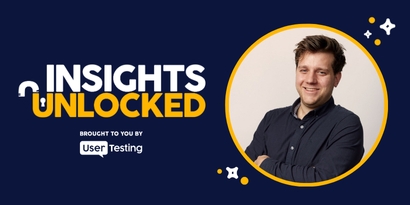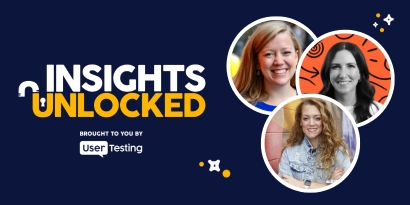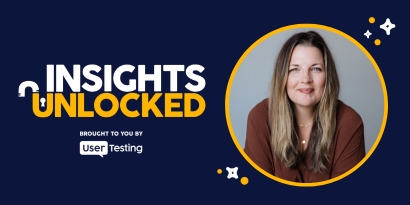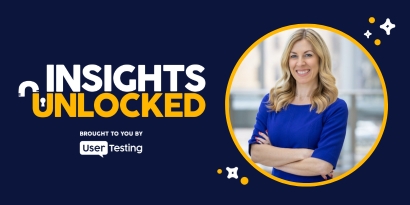
Episode 24 | December 06, 2021
Top book picks for UX, product, and CX leaders
Discover top book recommendations for UX, product, and CX leaders—insightful reads to spark innovation, empathy, and smarter strategy.
15 inspiring book recommendations for UX and product leaders
“Sometimes the right book lands in your lap exactly when you need it.” That’s the vibe of Episode 24 of Insights Unlocked, where the team rounded up a year’s worth of incredible book recommendations from some of the brightest minds in UX, product, and customer experience.
Whether you’re planning your next strategic move, looking to level up your leadership style, or just want to curl up with something that inspires creative thinking—this episode delivers.
From behavioral design and customer-first strategy to creative courage and business innovation, our guests didn’t just name-drop bestsellers—they shared personal stories and takeaways from books that changed their perspective, and in some cases, their careers.
Let’s dig into the highlights.
GUIDE
Competitive analysis with UserTesting
This guide provides ideas for how UserTesting can help you better understand your competitive differentiators and identify areas of opportunity according to your exact audiences.
Build better habits and design with empathy
It’s no surprise that books for customer experience leaders often focus on understanding human behavior—and how to gently influence it.
Reena Mehta, VP and Head of Product and UX at Kaplan, recommended Tiny Habits by BJ Fogg, calling it “a really simple and interesting approach to behavioral product design.”
“It’s about unlocking human behavior—ability, motivation, and triggers. I recommend it. It’s a good read.” – Reena Mehta
This aligns beautifully with one of the core themes across the show: creating experiences that resonate starts with empathy, not assumptions.
Books like Tiny Habits and User Friendly by Cliff Kuang and Robert Fabricant (recommended by Tamra Allen) help teams better understand the people behind the screens.
“The evolution of our field is built on understanding people. That’s what these books help you do.” – Tamra Allen
Embracing your creative side as a product leader
For those navigating what John S. Couch calls “shadow careers,” the message is clear: don’t wait to go all in.
The former VP of UX and Design at Hulu recommended Turning Pro by Steven Pressfield.
“It’s about moving from amateur to pro—getting out of the safe job near the fire, and stepping into the thing you really want to do,” Couch explained. “It’s terrifying, but worth it.”
Creativity doesn’t always fit neatly into a roadmap or a KPI, but for UX and product leaders, tapping into creative courage can be a game-changer.
That’s why Ed Catmull’s Creativity, Inc. also made the list, with Catherine Richards of Tesco Bank revisiting the classic to help overhaul design rituals.
Empathetic negotiation and communication
Looking to sharpen your communication skills while still putting empathy at the forefront? Add Never Split the Difference by Chris Voss to your cart.
Dan Storms, CPO at CookUnity, praised the book for its practical, people-first approach to negotiation—something he said has helped with everything from survey design to user interviews.
“Instead of asking why, ask what and how. People open up more—and that changes everything.” – Dan Storms
It’s a standout on any product management reading list, especially for leaders focused on building customer trust and better collaboration.
Exploring innovation and leadership at scale
Product leaders in large organizations often hear: that would never work here. But what if it could?
Christian Idiodi, partner at Silicon Valley Product Group, recommended No Rules Rules by Reed Hastings and Erin Meyer—a deep dive into Netflix’s culture of innovation.
“It’s about leading by context, not control. That mindset can scale, and this book shows how.”
This concept resonates with anyone responsible for shaping culture while scaling processes—especially those aiming to develop customer-first strategies within fast-growing teams.
Books that explore empathy and society
Understanding users also means understanding the broader systems they exist within. That’s where books like Caste: The Origins of Our Discontents by Isabel Wilkerson come in.
Christian Idiodi noted how it offers a deeper look at the social forces behind division and discontent, helping leaders “marinate” on the human side of their work.
Another standout is Connect by David Bradford and Carole Robin, shared by Carlos González de Villaumbrosia, founder of Product School.
“It’s life-changing. It helped me build better relationships not just at work, but at home. As a founder, that’s everything.”
For anyone seeking to enhance emotional intelligence and leadership through interpersonal dynamics, these books are a must-read.
Time, focus, and working smarter
In a world of endless tasks, one book emerged as a beacon of clarity: 4,000 Weeks by Oliver Burkeman.
April Dunford, author of Obviously Awesome, mentioned how the book reframes time management not as a race to fit it all in—but as a call to focus on what truly matters.
“You’re always going to have too much to do. So stop doing so much.”
For leaders seeking business strategy books that help them work more intentionally, this one belongs on the list.
The power of asking better questions
Teresa Torres, author of Continuous Discovery Habits, offered a shoutout to Think Again by Adam Grant, which explores how to help people (and ourselves) reconsider beliefs through curiosity, not confrontation.
“It’s about asking questions from a curiosity mindset—helping people rethink without attacking.”
This mirrors what so many UX book recommendations aim for: fostering empathy, open dialogue, and deeper understanding.
The full list of guest-recommended books
If you’re looking to build your professional development booklist for product and UX leaders, here’s a handy recap of the books mentioned:
- Tiny Habits by BJ Fogg
- Turning Pro by Steven Pressfield
- User Friendly by Cliff Kuang and Robert Fabricant
- Never Split the Difference by Chris Voss
- 1971: Never a Dull Moment by David Hepworth
- Jobs to Be Done by Jim Kalbach
- No Rules Rules by Reed Hastings and Erin Meyer
- Caste: The Origins of Our Discontents by Isabel Wilkerson
- Creativity, Inc. by Ed Catmull
- Snow Crash by Neal Stephenson
- The Gentleman in Moscow by Amor Towles
- Klara and the Sun by Kazuo Ishiguro
- 4,000 Weeks by Oliver Burkeman
- Who Not How by Dan Sullivan and Ben Hardy
- Think Again by Adam Grant
- Connect by David Bradford and Carole Robin
Why books still matter in the age of AI
With so much content coming at us all the time, it might seem old-school to turn to books for inspiration. But there’s something about a well-written, deeply researched book that sticks with you.
And as this episode of Insights Unlocked shows, the best books do more than entertain—they unlock new ways of thinking, working, and leading.
These titles aren’t just books for UX professionals or marketing execs—they’re roadmaps for building more empathetic, innovative, and human-centered businesses.
“The right book can change your mindset, your work, and your life. That’s why we keep asking our guests what they’re reading—it’s often where their best ideas come from.” – Nathan Isaacs
Episode links:
- The 11 best books for product managers: This blog post offers a curated list of essential readings for product managers aiming to enhance their skills and navigate challenges effectively.
- Making the case for content testing in your organization: This webinar features insights on advocating for content testing within teams, aligning with discussions on the importance of content strategy in customer experience.
- The complete guide to user interviews: This comprehensive guide explores the nuances of conducting user interviews, resonating with themes of understanding user behavior and needs.









